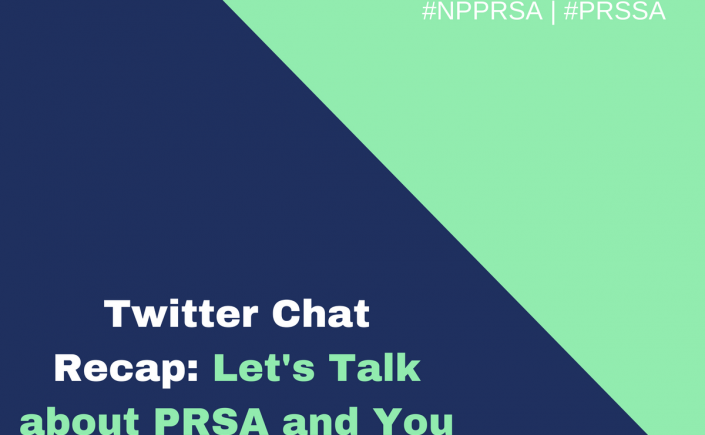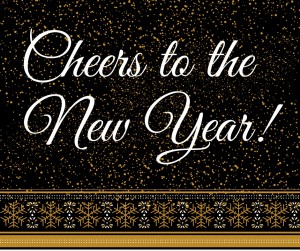Twitter Chat Recap: Let’s Talk About PRSA and You
By: Emma Finkbeiner, PRSSA Immediate Past President
Last week, PRSA New Professionals co-hosted a lively Twitter chat with PRSSA, engaging both new professionals and PRSSA members in a conversation about the transition from student to professional. Check out some of the highlights from the chat below.
@PRSSANational: Let’s kick off the chat with a question for everyone. How did you discover public relations?
https://twitter.com/PRSSANational/status/996556588503609345
@OFlynn_Emily: A1: My mom is a marketing manager in the healthcare industry. When I was in high school, she told me that she thought I’d thrive in the public relations field. Now I’m entering my senior year of college in a major I’m so passionate about! #HappyMothersDay #PRSSA
https://twitter.com/OFlynn_Emily/status/996557556595281921
@nicole_graney: A1 #PRSSA: I discovered PR with the help of a lovely mentor, @cmwooll, who took me under her wing as a high school student and showed me how I can use my writing to tell stories. She’s been helping me tell them ever since!
https://twitter.com/nicole_graney/status/996557803870441472
@robyn_rl: A1: Accidentally! My first job was at a bar/restaurant in my hometown & they decided they needed some marketing things designed & some outreach done to local organizations & media. So I volunteered & loved it #PRSSA
https://twitter.com/robyn_rl/status/996557337065377792
@PRSANewPros: New Pros: What are some of the benefits of becoming a PRSA Associate Member and joining the PRSA New Professionals Section?
https://twitter.com/PRSANewPros/status/996558349746483202
@GregRokisky: It’s such an affordable rate, it’s perfect to test the waters in the #PRSA universe…and you’ll find there’s no turning back because you’ll meet just the most wonderful colleagues, friends, mentors and people who just get you // #PRSSA #NPPRSA
https://twitter.com/GregRokisky/status/996559086861934592
@Gemrick: My favorite benefits of joining @PRSA is access to an extensive job board, and the MyPRSA and New Pros community forums that connect you to everyone in PRSA. You can ask questions, seek advice, and get help from peers and experts! #PRSSA
https://twitter.com/Gemrick/status/996559444908572672
@citygirlhanna: The greatest advantage, to me, is being able to bounce ideas off my peers. While having mentors is important, it can be very helpful early in your career to chat with those at your same level about their experiences, as all companies and industries are so different. #PRSSA
https://twitter.com/citygirlhanna/status/996559697112129537
@PRSSANational: Students: What are some of the challenges you’re facing or concerns you have as you prepare for the transition from student to professional?
https://twitter.com/PRSSANational/status/996560118438400001
@bridgetmurtha_: A3: Personally, I have learned so much in all my classes as a student but I am nervous about applying what I have learned about the field when becoming a professional. Overall, practice makes perfect & in order to grow within PR, I will have to try! #PRSSA
https://twitter.com/bridgetmurtha_/status/996560664926842880
@adcook22: A3: How to continue setting achievable goals at the start of your career! “Get a job”, “graduate” or “work in x area” of PR were almost automatic as undergrads, but starting your career is a path that’s much more personalized #PRSSA
https://twitter.com/adcook22/status/996561139625615360
@Marissa_218: As I enter my senior year of undergrad, I am confident in my PR abilities but the job search/find process is very intimidating! #PRSSA
https://twitter.com/Marissa_218/status/996560671277043712
@PRSANewPros: New Pros: How did PRSA and the New Professionals Section help you smoothly transition from student to professional?
https://twitter.com/PRSANewPros/status/996561872718528514
@KayAnnePR: NP Answer: One of the greatest benefits of joining @PRSA for me is that I was able to continue the relationships I made in #PRSSA.
https://twitter.com/KayAnnePR/status/996562926701043713
@efink101: It provided me with a network of peers that are going through the same things as me, so we can relate, but also a network of mentors who want to lift up new professionals. It kept me engaged in the profession beyond my job. #PRSSA
https://twitter.com/efink101/status/996563796377432070
@Gemrick: I can confidently say that @PRSA and New Pros helped my transition feel seamless. During my last year of undergrad, I was heavily involved with my local PRSA chapter, and attended as many events as possible. (Come through student pricing!) #PRSSA
https://twitter.com/Gemrick/status/996564005882867714
@PRSSANational: Students: How could PRSA and the New Professionals best assist you in your transition to the profession and the professional Society?
https://twitter.com/PRSSANational/status/996563682208501760
@KEW_photo: Any help is needed and appreciated! I loved @PRSAChicagoYPN event with the recruiters this was really eye opening that it is important to work with professionals who specialize in the job hunt #prssa
https://twitter.com/KEW_photo/status/996564406145204224
@nicole_tobias32: I think having a new professionals mixer hosted by your local PRSA Chapter would be a great way to connect with others who are in the same boat with you! Especially if someone has moved from out of state to work in your area! #PRSSA
https://twitter.com/nicole_tobias32/status/996564589222428672
@AllisonMellor: I would love to see local #PRSA representatives at #PRSSA chapter meetings! This would be the perfect time to hear more about membership benefits and new industry trends.
https://twitter.com/AllisonMellor/status/996565848566386688
@PRSANewPros: New Pros: What are the best ways to get involved when first joining a local PRSA Chapter?
https://twitter.com/PRSANewPros/status/996565396114300929
@KirkHazlett: Not exactly a “New” Pro, but…get involved! Volunteer to serve on a committee. Help with event promotion or at the registration table. Be there. Be seen. Become a resource. @CCPRSA @USFPRSSA @utprssa @PRSATampaBay #prssa
https://twitter.com/KirkHazlett/status/996565781885411328
@GregRokisky: Ask! I met with a few local board members I’d developed relationships with and others I didn’t yet know and, it turned out, there was a need for a chair for the @PACEAwards—our local awards! No one else wanted it, so I said yes. Even as a new pro, you have skills! #PRSSA #NPPRSA
https://twitter.com/GregRokisky/status/996566119103246336
@efink101: 1) See if there is a Young Professionals Network. 2) See if there are any committees or subcommittees you can join and help out with. 3) Offer to be a liaison to the #PRSA Chapter’s #PRSSA Sponsor Chapter(s).
https://twitter.com/efink101/status/996566487572893701
@PRSSANational: Students: What other questions do you have about joining PRSA, the New Professionals Section or launching your career?
https://twitter.com/PRSSANational/status/996567213044895748
@EmilyZekonis: If you could go back in time and take one class you missed out on to help you in your PR career what would it be? #prssa
https://twitter.com/EmilyZekonis/status/996567261447114752
@alyssamurt: As an upcoming senior, I think it is always beneficial to hear how new (and old!) pros got their first job. Any tips are much appreciated! #PRSSA
https://twitter.com/alyssamurt/status/996567487281090562
@Ashleigh_K_W: What certifications or hard technical skills could students learn to gain an edge? We know writing is a must, but are there any programs we should be studying? Muckrack? Sysomos? #PRSSA
https://twitter.com/Ashleigh_K_W/status/996568287390715904
@ambewelch: Some of us new grads don’t have jobs or internships lined up fresh out of college, what advice for new pros that are struggling to find employment? How should they stay motivated through their job search? #PRSSA
https://twitter.com/ambewelch/status/996569255968690176
@PRSANewPros: New Pros: What is your best post-grad tip for success during your first year as a new professional?
https://twitter.com/PRSANewPros/status/996568919434547200
@JaCeyLynn_Y: Work hard and try to make a name for yourself. If you see an opportunity, don’t hesitate to take it. Also, don’t forget your organization skills you acquired in school. #PRSSA
https://twitter.com/JaCeyLynn_Y/status/996569597431156736
@sarahgdougherty: Late to the party! I’d say take things in stride and have a good attitude. Things may not come naturally at first, but bringing a positive outlook to the table and being willing to work hard and try new things will set you up for success and make you a go-to on your team #PRSSA
https://twitter.com/sarahgdougherty/status/996570480340537345
@GregRokisky: There’s a small window, even as a new pro, where you have the free time. Take advantage and say yes to as much as you can handle and figure out where you fit—the more you move up the less time for those things you have! #PRSSA
https://twitter.com/GregRokisky/status/996569316819718144
@efink101: For me personally, be resilient and don’t take things personally is my best advice. Starting a new job and becoming a professional rather than a student is sometimes difficult, but if you work hard and show your value, you’ll be fine. #PRSSA
https://twitter.com/efink101/status/996570879080484865
Thank you to everyone who participated in this chat. The conversation doesn’t have to end here! Students, feel free to reach out to members of the PRSA New Professionals Section any time with questions about transitioning from PRSSA to PRSA. And don’t forget, when you transition from PRSSA to PRSA Associate Membership, you can join for free using code AM18.








